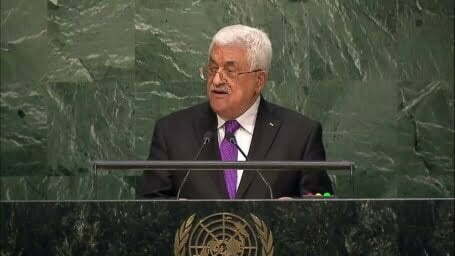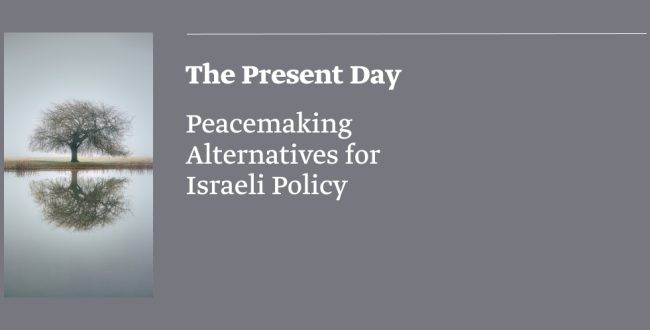Last year, Israel’s former Economy Minister Naftali Bennett harshly criticized US Secretary of State Kerry for saying that the ongoing conflict between Israel and the Palestinians was the reason that Muslim youths were joining ISIS. His outrage touched on a core issue that has long been the subject of ideological debate not only between US and Israeli politicians, but also within Israel. Is the Israeli-Palestinian conflict at the root of the conflict between Israel and the Arab and Muslim world, or is the Palestinian issue merely being used as an excuse to prolong the conflict and destroy Israel? After all, at the heart of the problem, as Netanyahu often claims, lies refusal to acknowledge Israel’s legitimacy “and everything else is an excuse”.
In reality, this is yet another matter in which politics dictate the answer. The Israeli right wing’s argument has a degree of historical justice to it: the Arab-Muslim world, by and large, indeed refuses to acknowledge the legitimacy of the State of Israel; the Arab countries started fighting Israel before the Palestinian issue became a matter of international concern given Israel’s control of the West Bank and the Gaza Strip; and over the many years of conflict, these countries have exploited the Palestinian issue for their own purposes. However, this is a far cry from saying that the Palestine problem is merely an excuse for prolonging the conflict. A quick look at history is enough to refute this view of the interaction between the internal Jewish-Palestinian conflict and the cycle of conflict between Israel and the Arab world.
First, it is important to clarify what is meant by “the Palestine problem” – a concept that primarily represents the Arab view of the conflict between the Zionist movement and the Arab Palestinian population. During the British Mandate (1920-1948), it signified the idea that the future of Palestine as Arab territory and as an inseparable part of “the Arab homeland” was under existential colonialist threat. The Zionist movement continued to be seen as colonialist after the State of Israel was established, but from that point on the term was used to denote the historical injustice committed towards the Palestinians in 1948 and the need to resolve the Palestinian refugee problem. Over time, “the Palestine problem” also came to represent the challenge that Israel’s very existence posed to the Arab world, becoming a synonym for the conflict between the Arab world and Israel.
Historically, the conflict began as an internal affair between Jewish-Zionists who immigrated to historic Palestine and the local Arab population. The latter made an effort to enlist the political and material support of the Arab and Muslim peoples, who gradually came on board out of concern for the Muslim future of Palestine, and particularly regarding the holy Islamic sites in Jerusalem. These considerations were compounded by self-interest, especially as public awareness of the Jewish-Arab conflict in Palestine grew in Arab countries from the 1930s onwards, turning the matter into an issue of political competition over the Arab electorate.
It was only after the Arab Revolt of 1936 that the conflict began to take on a regional dimension. The leaders of neighboring Arab countries intervened diplomatically at the behest of Britain, which was eager to end the six-month-long Arab strike and violence. Britain continued this policy after the revolt was quelled, since Arab and Muslim attention to the conflict was growing and Britain assumed that any escalation would harm its imperial interests in the Middle East and in India (due to the Muslim population there). Arab involvement in the Palestinian issue peaked when forces from Egypt, Syria, Iraq, and Jordan invaded Palestine several hours after the establishment of the State of Israel was declared on May 14, 1948.
Although the decision to invade Israel was made collectively, the Arab leaders were motivated by a various self-interests that undermined their joint effort and played a part in their defeat. Contrary to the common Israeli narrative, not a single leader of an Arab country wanted to go to war. Those who eventually did were responding to extreme public pressure and to incitement by the opposition from the right and the left alike, given the scope of the disaster that had befallen the Palestinian Arabs during the inter-communal war (December 1947-May 1948). This disaster was embodied by the massive exodus of Palestinian Arabs from their homes, with thousands of them finding refuge in neighboring Arab countries. Historically, therefore, it was the Jewish-Arab conflict in Palestine that dragged the rest of the Arab and Muslim world into a conflict, which has since grown into regional and international proportions. If the leaders of the Arab world exploited “the Palestine problem” for their own ends, they did so because they recognized its centrality to political Arab consciousness and therefore to their own political survival.
The Arab defeat in the 1948 war, Israel’s development as a state, and the lack of a solution for the Palestinian refugee problem – all these factors expedited political radicalization and instability within the Arab countries, in the form of military coups and political assassinations. One response by Arab leaders was to compete over a show of commitment to resolving “the Palestine problem” as apparent proof of their adherence to pan-Arab nationalism. This competition, and the official anti-Israeli propaganda that went with it, reflected recognition of the emotional and symbolical power of hostility towards Israel in the Arab public – the flames of which the leaders themselves helped stoke. Yet despite the popular image of intensive Arab engagement with this issue, before 1967 actual activity on the matter largely consisted of extremist propaganda, an economic and political boycott, and partial support for guerilla warfare against Israel. Along with virulent anti-Israeli rhetoric, this policy indeed indicated less concern for the fate of the Palestinians and more self-justification and an attempt to gain political clout at home and throughout the Arab world. The Arab leaders had to especially emphasize their commitment to annihilating Israel and restoring Palestinians’ rights by force, due to the ongoing lack of military action by Arab countries in the first two decades of Israel’s existence.
The Arab countries’ reluctance to become embroiled in an offensive against Israel led to the resurgence of a Palestinian nationalist movement as of the late 1950s. The movement, named Fateh, subsequently became the leading Palestinian guerilla organization. Fateh’s guerilla warfare sought to drag the Arab countries into war with Israel despite their recalcitrance. Indeed, the armed Palestinian struggle in the two years preceding the 1967 war was a major reason for the military escalation along Israel’s border with Syria, which was the root cause of the military escalation of May-June 1967 and the culmination in war. Syria’s support of the Palestinian guerilla attacks, which largely came through the border with Lebanon, served both internal and inter-Arab Syrian interests. By supporting the war for the liberation of Palestine, Syria’s radical Ba’th regime wished to challenge Nasser’s passivity in the conflict with Israel and gain prestige and legitimacy on both domestic and regional levels.
Israeli researchers and pundits who represent a “national” view of the conflict often cite “Palestinian treacherousness” or the violent confrontations between Palestinians and various Arab regimes including Jordan, Lebanon, and Syria as proof that the Palestinian issue is not a top Arab priority. However, the friction between the Palestinians and Arab countries does not mean that “the Palestine problem” is merely a pawn in the hands of political players.
These relations are dialectic, deriving from ideological identification on one hand and rejection or even oppression of Palestinians as individuals and armed groups on the other. The relations between Arab states and the Palestinians oscillate between material self-interests and the burden of the shared Arab identity. The latter tends to swell when faced with a foreign threat to regional actors, epitomized by Israel. This dialectic indeed blurs the distinction between cause and effect regarding the attitude of the Arab world to the Jewish-Arab conflict in historic Palestine. However, a close study of these relations has led many historians to conclude that the Palestine problem continued to serve as a major – and even leading – factor in shaping the Arab League as a regional framework for the Arab countries and in formulating the Arab national doctrine.
Since the British Mandate, successive Arab leaders have spouted rhetorical commitment to resolving “the Palestine problem” while acting quite differently on the ground. They certainly attempted to use the problem to their own ends. After 1967, however, the Palestinians developed military capability, garnered public support throughout the Arab world, and provoked the regimes of Jordan, Lebanon, and Syria. They were treated accordingly, as those governments would treat any actor threatening their sovereignty. That is why a number of Arab states tacitly supported Israel in 1982 when it insisted on expelling the Palestinian organizations from Lebanon, including their headquarters and military troops.
Yet this broad Arab support for virtually eliminating the last Palestinian territorial stronghold had nothing to do with the need to promote a solution, as imperfect as it may be, for “the Palestine problem”. This need was indeed reflected in the September 1982 adoption of the first Arab peace plan by the Arab Summit Conference held in Fes, Morocco. The Conference roughly adopted the outline of UN Security Council Resolution 242 concerning Israel’s withdrawal to the 1967 borders, which would be recognized by the Security Council. additionally, it emphasized the Palestinians’ right to self-determination and to an independent state in their homeland – i.e., the West Bank and the Gaza Strip, including East Jerusalem – and recognized the right of return of the Palestinian refugees. The PLO was allotted a major role in implementing the plan.
The clearest indication that “the Palestine problem” is at the heart of the Arab-Israeli conflict arose after the Oslo Accords were signed by Israel and the official Palestinian leadership headed by Arafat. The agreement caused a psychological rift among sworn Arab nationalists, including longtime Palestinian detractors of Arafat who criticized its terms and content. Yet while Egypt was diplomatically and economically boycotted for signing an independent peace treaty with Israel, no one questioned the PLO’s exclusive authority to sign its own accord with Israel. Moreover, the fact that the Oslo Accords were signed by “the owners of the problem” effectively released the Arab countries – and especially those geographically distant from Israel – from the chains of commitment to the fate of the Palestinians.
The Oslo Accords immediately motivated Jordan to enter into negotiations with Israel, due to the complex relations between the Hashemite regime and the Palestinians in Jordan and in the West Bank. However, the fact that Morocco, Tunisia, Mauritania, Oman, and Qatar – states whose only conflict with Israel stemmed from the Palestine conflict – were quick to recognize Israel and establish diplomatic ties with it, demonstrated just how central the Palestinian issue was in their attitude to Israel. Furthermore, many Arab countries, including some that did not establish diplomatic ties with Israel, took part in the multilateral negotiations on regional cooperation held between 1991and 1996. Also, following the Oslo Accords, the Arab League officially cancelled the second- and third-degree boycotts, leaving in place only the boycott of direct economic ties with Israel, which had become partial by then.
The countries that established diplomatic relations with Israel under Rabin and Peres acted as though the Oslo Accords had relieved them of a heavy burden, born not of a direct conflict with Israel but of the need to accommodate public opinion and to meet pressure by other Arab regimes advocating for a uniform Arab front for their own interests. The growing acceptance of Israel by Arab ruling elites in the first three years the Oslo Accords became a matter of deep concern for Arab nationalists, who feared a loss of collective Arab national identity without the Palestinian axis and consequently the conflict with Israel, which had played a major role in forming the pan-Arab national identity.
However, just as the Oslo Accords gave the signal for a major removal of the Arab boycott and establishment of diplomatic relations with Israel, the collapse of the process and eruption of the al-Aqsa Intifada were pivotal to the decision to cut ties with Israel. Some regimes did so mere weeks into the Israeli-Palestinian confrontation, and some several years later. Again, the reason was the harsh public response in the Arab countries, this time to the hundreds of Palestinian victims in the first few weeks of the Intifada – especially as those regimes, unlike Egypt and Jordan, did not have a direct security stake in maintaining ties with Israel. Yet even Egypt and Jordan, two states that saw themselves as committed to the peace treaties they had signed with Israel – primarily due to the US guarantees for the treaties – recalled their ambassadors in Israel for quite some time. It was the least they could do to assuage opposition demands to cut all ties with Israel.
The Arab-Israeli conflict often serves statesmen and researchers as a ready explanation for various problems, be it economic underdevelopment in the Arab world, international Islamist terrorism, or the recent wave of Jihadists joining ISIS forces in Syria and Iraq. We can, and should, question the validity of an approach that tends to view any negative occurrence in the Middle East as the consequence of the Arab-Israeli conflict or the Palestinian-Israeli conflict.
At the same time, denying the central role of the Israeli-Palestinian conflict in regional politics serves those who object to any agreement on a Palestinian state in the West Bank, Gaza Strip and East Jerusalem. This, however, in no way detracts from the validity of the historical fact that the core of the regional conflict is the internal Jewish-Arab conflict within the borders of Mandatory Palestine. Here, within those borders, is where the future of the State of Israel will be decided. Until such time, continuation of the internal conflict will not only block normal relations between Israel and the Arab and Muslim states but also jeopardize existing peace treaties, primarily with Jordan and Egypt – not to mention the harm to Israel’s international status.
Translator: Michelle Bubis
















